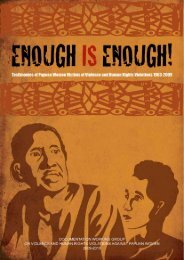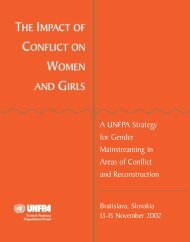Sexual exploitation and abuse by UN peacekeepers - PeaceWomen
Sexual exploitation and abuse by UN peacekeepers - PeaceWomen
Sexual exploitation and abuse by UN peacekeepers - PeaceWomen
You also want an ePaper? Increase the reach of your titles
YUMPU automatically turns print PDFs into web optimized ePapers that Google loves.
8<br />
Carlyn van der Mark<br />
Political Science Master Thesis - <strong>Sexual</strong> <strong>exploitation</strong> <strong>and</strong> <strong>UN</strong> <strong>peacekeepers</strong><br />
Allegations of sexual <strong>exploitation</strong> <strong>and</strong> <strong>abuse</strong> occur when soldiers who are trained for in-war<br />
fighting, indoctrinated with ideals of domineering strength, are then working in an<br />
environment that does not require immediate violence. The peacekeeping environment is<br />
about non-violence <strong>and</strong> ensuring a transition of peace that requires sensitivity to the local<br />
population. Meanwhile, the soldiers are still living in a highly militarized environment. The<br />
solider has to switch mindset from a soldier to a peacekeeper. It is this switch in expectation<br />
<strong>and</strong> environment that some U.N <strong>peacekeepers</strong> are unable to manage, which leads to<br />
aggressive behavior <strong>and</strong> in some cases, sexual <strong>exploitation</strong> of the local population<br />
(Fetherston, 1995, p.21). The U.N military <strong>peacekeepers</strong> involvement in sexual <strong>exploitation</strong><br />
is that troops cannot exercise their training with a propensity to manliness <strong>and</strong> violence.<br />
Instead, the men exercise their „manliness‟ through sexual practices that can lead to sexual<br />
<strong>exploitation</strong> <strong>and</strong> <strong>abuse</strong> (Whitworth 2004, Higate 2007).<br />
“Boys will be Boys”<br />
Militarized masculinities can also be derived from essentialist feminist theory. The<br />
justification for the behavior of U.N <strong>peacekeepers</strong> is “boys will be boys” (Cockburn, Hubric,<br />
2002). The behavior of men is a result of their biological attributes of needing <strong>and</strong> wanting<br />
sex. Men are depicted with a need for sexual release, hence having sexual relations with the<br />
local population. The “Boys will be Boys” argument further indicates that the hyper<br />
masculine culture encourages sexual <strong>exploitation</strong> <strong>and</strong> <strong>abuse</strong> <strong>and</strong> this is maintained within a<br />
„wall of silence‟ (Refugee International, 2004 p.6). However, the essentialist argument has<br />
drawbacks for relying on simplified biological determinants. To argue only that men need sex<br />
ignores the social structures that provide a more thorough analysis on sexual <strong>exploitation</strong>.<br />
Social masculinities, derived from militarized masculinities, argues for the significance of<br />
social structures that create an environment <strong>and</strong> circumstances of sexual <strong>exploitation</strong>.<br />
Social masculinities<br />
Social masculinity stems from the argument of militarized masculinities, but focuses on the<br />
importance of social structures to explain for sexual <strong>exploitation</strong>. Social structures<br />
incorporate the importance of context in explaining behavior. The explanatory factor for the<br />
failure of the zero-tolerance towards sexual <strong>exploitation</strong> is a result of economic <strong>and</strong> social<br />
power relationships (Higate 2007, Clarke 2008). These relationships are based on a supplydem<strong>and</strong><br />
cycle where<strong>by</strong> food or money is exchanged for sex (Clarke, 2008). U.N




![IANSA [PDF, 2MB] - PeaceWomen](https://img.yumpu.com/25206379/1/190x123/iansa-pdf-2mb-peacewomen.jpg?quality=85)
![Commitments Sample [PDF, 93KB] - PeaceWomen](https://img.yumpu.com/25206331/1/190x245/commitments-sample-pdf-93kb-peacewomen.jpg?quality=85)










![A Toolkit for Advocacy and Action [PDF, 260KB] - Peace Women](https://img.yumpu.com/25205989/1/190x245/a-toolkit-for-advocacy-and-action-pdf-260kb-peace-women.jpg?quality=85)